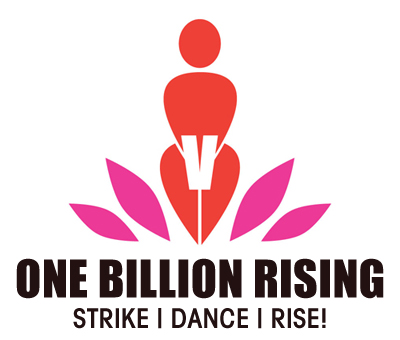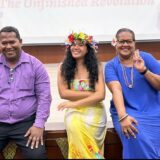One Billion Rising: Whose Dance Is This?
 The One Billion Rising Campaign was observed for the second time today. Launched on Feb 14, 2013, it is a global campaign that hopes to increase awareness about violence against women, by inspiring people to take a break from their work and dance for the cause. Last year, several people across the globe rose and danced for liberation and freedom from violence. But as the dancers settled, stories emerged on inequity and injustice from within the feminist movement.
The One Billion Rising Campaign was observed for the second time today. Launched on Feb 14, 2013, it is a global campaign that hopes to increase awareness about violence against women, by inspiring people to take a break from their work and dance for the cause. Last year, several people across the globe rose and danced for liberation and freedom from violence. But as the dancers settled, stories emerged on inequity and injustice from within the feminist movement.
In an Open Letter addressed to Eve Ensler, Canadian activist Lauren Elk expressed her anger over the appropriation of a date that had been used to honor the violence against indigenous women in Canada.
She wrote:
“When I told you that your white, colonial, feminism is hurting us, you started crying. Eve, you are not the victim here. This is also part of the pattern which is a problem: Indigenous women are constantly trying to explain all of these issues, and are constantly met with “Why are you attacking me?!” This is not being a good ally.”
Activists from Congo expressed similar concerns when Eve compared her experience of cancer to the physical trauma caused to women by gang rape in the DRC. They wrote:
“We cannot end violence against women and children until we recognise the humanity of all of us; this article reduces Congolese women to bodies and holes. That isn’t recognising their humanity; it is replicating the same power structures of the White Supremacy.”
One Billion Rising also failed to take a strong stand against patriarchy and institutionalized violence. In an editorial in the Huffington Post, Natalie Gyte, the head of communications for the Women’s Resource Center, wrote:
The primary problem with One Billion Rising is its refusal to name the root cause of women’s inequality; its outright refusal to point the finger at a patriarchal system which cultivates masculinity and which uses the control and subjugation of women’s bodies as an outlet for that machoism.
While this immediately brings to mind images of women being brutalized, it is also important to understand that the institution of patriarchy perpetuates other forms of control, including the control over women’s sexual and reproductive choices. Patriarchal societies spawn patriarchal laws that use the power of the State to police women’s sexualities, preventing them from exercising their basic rights, including their right to safe abortion. A large and heavily funded anti-choice movement, also taking root from patriarchal institutions, also perpetuates guilt and stigma, making it extremely difficult for societies to acknowledge the fact that forcing a woman to continue a pregnancy against her will is a form of violence and torture. The deliberate failure to acknowledge patriarchy excludes these forms of violence that millions of women suffer every year.
In spite of the criticism, the idea of One Billion people “rising” against violence does spark enthusiasm, and creates a reason for large numbers of people to become involved in an issue like violence against women that is otherwise silenced and stigmatized. Several events in the Global South did manage to tailor their activities to suit the local cultures. The ASAP team attended OBR in Mumbai, which identified the institutionalization of violence, acknowledged violence that comes with the loss of social privilege, and gave voice to marginalized women, including Dalit women, tribal women, sex workers, trans-women, disabled women and lesbian women. India “rose” shortly after a brutal rape in Delhi created shock waves across the nation, and Indian feminists already feeling the heat of non-inclusive politics were quick to create events that acknowledged the racial, gender, economic inequities in the society.
Over the year, OBR was studied and analyzed by feminists around the world. This blog post stood out to me. Andrea Smith, a feminist and blogger wrote about the need to critically study OBR’s pitfalls in order to create global movements that were inclusive. She wrote about what such a movement would look like:
This movement would interrogate how the very category of “woman” has served as a tool of violence. It would examine how colonialism has operated by imposing a gender binary system in indigenous communities in order to facilitate the imposition of colonial heteropatriarchy. It would thus see organizing around violence against trans peoples as central to any struggle against gender violence.
She raises a number of points that will resonate with feminists in the global south. So as the world embarks (a little divided, this time) on a mission to rise, strike and dance, it is important to understand the need to recognize one’s own privilege and push back against privilege, as noted by this blogpost from Black Girl Dangerous :
I’ve often said that it’s not enough to acknowledge your privilege. And, in fact, that acknowledging it is often little more than a chance to pat yourself on the back for being so “aware.” What I find is that most of the time when people acknowledge their privilege, they feel really special about it, really important, really glad that something so significant just happened, and then they just go ahead and do whatever they wanted to do anyway, privilege firmly in place. The truth is that acknowledging your privilege means a whole lot of nothing much if you don’t do anything to actively push back against it.
And she goes on to say how: Relinquish power, Just don’t go, Shut up and Be careful what identities you claim.






